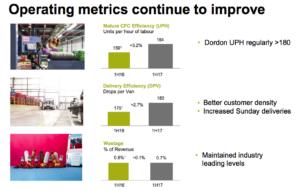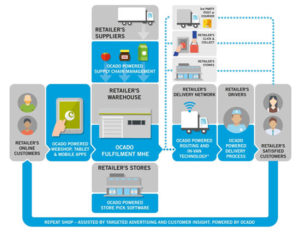UK-based company Ocado has been credited with revolutionising the UK’s e-grocery arena. An online player with cutting-edge technology, a centralised hub-based delivery system and lucrative partnerships with high-end retailers, and Ocado is profitable. Sales in 2017 are expected to grow towards 1,5 bln Euro. Net margin was 1%.
Online grocery delivery requires dealing with irregularly shaped products with many different form factors, multiple storage temperature regimens, short shelf lives, and food technology constraints about what can be packed with what. Then there are the many vulnerable products and the ways they can negatively interact with each other.
Ocado Smart Platform
All the technology that powers this disruptive business model has been built in-house. Ocado has been profitable at an order level for many years but has chosen to invest heavily in building its technology platform; the Ocado Smart Platform (OSP). It’s a one-stop-shop, end-to-end e-commerce, fulfillment, and logistics platform running in the cloud that provides a seamless integrated solution for an offline retailer.
Ocado about OSP: “Think of it as a highly configurable Software as a Service (SaaS) platform that also includes the swarm robotics hardware technology needed to build automated warehouses. This combination of cloud-based software and warehouse automation provide the secret sauce of how to make online grocery delivery profitable, and how to deliver enhanced customer delight in the form of massively greater range, greater product life and freshness, lower wastage, very low levels of substitution, and the ability to pick a complete customer order in just a few minutes.
Looking ahead, OSP customers will quickly see the network effects associated with adopting such a platform, including all the data we will collect to optimize the underlying platform and feed our machine learning, while also giving the retailers back their own data. Then there is the increased R&D investment on the back of having multiple customers and creating an ecosystem through easy integration with third-party products and services. Ultimately, a platform for online grocery is more than just writing smart algorithms, mining customer data, and employing warehouse automation; it is based on understanding and adapting to the realities of the retail market, disrupting its existing business models, and recognizing that customer loyalty is earned through experiences instead of features.
Fifty years ago, customers would telephone their local grocery store. The person at the store already knew what they typically ordered — and would then have someone deliver the groceries on a bike or in a small van. The technologies and formats may have changed, but differentiation through brand, product range, customer knowledge, and customer service are still at the heart of being a great grocer”.
Read the full case study here.


